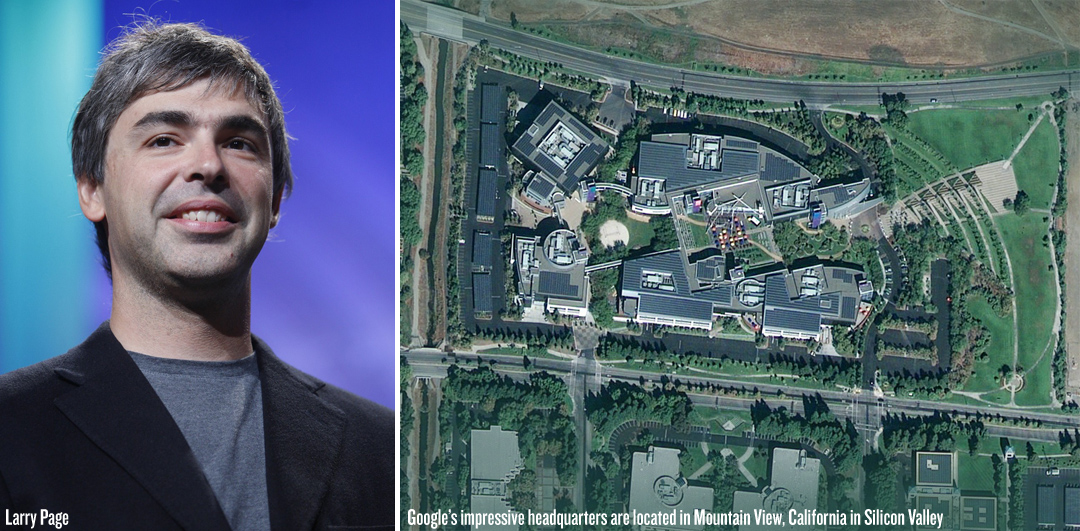Google founder and CEO Larry Page (born March 26, 1973) sat down with Charlie Rose last week for an incredible one-hour special, and I’ve watched it twice — it’s that good. Their conversation touches on many topics, but some key areas they discuss are: Google’s relationship with Facebook, censorship in China, how Google went from a small idea between two buddies at Stanford to the behemoth it is today, how we live in a world where we easily forget how far we’ve come (yes, there was a time not that long ago when online maps did not exist), and the mindblowing projects his company has in the works. One of which is Larry’s dream of building the infrastructure for computer-controlled driving. And in case you might have thought this idea is way off in the future, it’s not. The episode shows a video of a blind man in Arizona — where the technology is undergoing testing — who goes about his business around town, and it might just bring a tear to your cheek.
During an orientation for new students at Stanford University in March 1995, Larry Page met his future Google co-founder Sergey Brin. In a recent interview for The Economist, Brin jokingly said: “We’re both kind of obnoxious,” and they often disagreed on most subjects when they first met. But after spending time together, they “became intellectual soul-mates and close friends”. Brin’s focus was on developing data mining systems while Page’s was in extending “the concept of inferring the importance of a research paper from its citations in other papers.” Together, the pair authored what is widely considered their seminal contribution, a 1998 paper entitled “The Anatomy of a Large-Scale Hypertextual Web Search Engine” (read it in full by CLICKING HERE). Combining their ideas, they “crammed their dormitory room with cheap computers” and tested their new search engine designs on the web. Their project grew quickly enough “to cause problems for Stanford’s computing infrastructure.” But they realized they had succeeded in creating a superior engine for searching the web and suspended their PhD studies to work more on their system.
As Mark Malseed wrote, “Soliciting funds from faculty members, family and friends, Sergey and Larry scraped together enough to buy some servers and rent that famous garage in Menlo Park. [Soon after], Sun Microsystems co-founder Andy Bechtolsheim wrote a $100,000 check to ‘Google, Inc.’ The only problem was, ‘Google, Inc.’ did not yet exist — the company hadn’t yet been incorporated. For two weeks, as they handled the paperwork, the young men had nowhere to deposit the money.” The Economist magazine describes Brin’s approach to life, like Page’s, as based on a vision summed up by Google’s motto, “of making all the world’s information ‘universally accessible and useful.'” Others have compared their vision to the impact of Johannes Gutenberg, the inventor of modern printing:
“In 1440, Johannes Gutenberg introduced Europe to the mechanical printing press, printing Bibles for mass consumption. The technology allowed for books and manuscripts – originally replicated by hand – to be printed at a much faster rate, thus spreading knowledge and helping to usher in the European Renaissance. Google has done a similar job.”
The comparison was likewise noted by the authors of The Google Story: “Not since Gutenberg has any new invention empowered individuals, and transformed access to information, as profoundly as Google.” Not long after the two “cooked up their new engine for web searches, they began thinking about information that is today beyond the web”, such as digitizing books, and expanding health information. In 2011, Larry Page was ranked 24th on Forbes’ list of billionaires and as the 11th richest person in the United States. He is deeply committed to renewable energy technology, and with the help of Google.org, Google’s philanthropic arm, promotes the adoption of plug-in hybrid electric cars and other alternative energy investments. Larry Page and Sergey Brin rank at #30 in Forbes’ 2012 list of The World’s Most Powerful People.
In 2011, Google’s revenue was $37.91 billion; its operating income was $11.63 billion; its profit was $9.74 billion; its total assets measuring $72.58 billion; its total equity pegged at $58.15 billion, and it total number of employees totalling 33,077 in 2012. Google has been estimated to run over one million servers in data centers around the world, and process over one billion search requests and about twenty-four petabytes of user-generated data every day.


